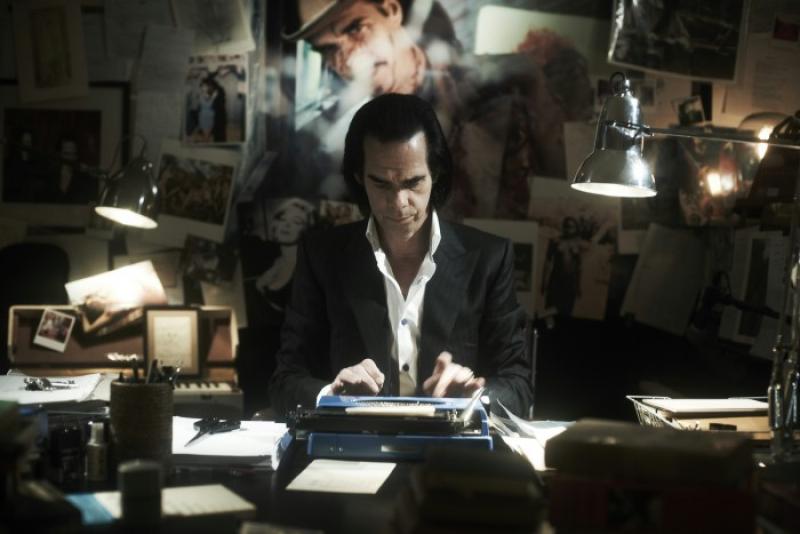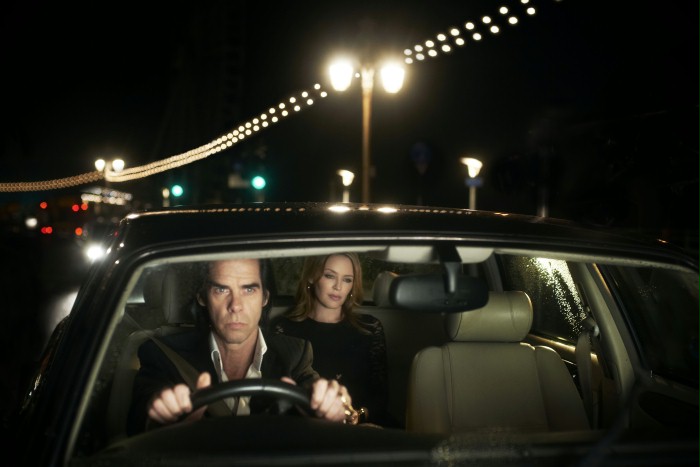Berlinale 2014: 20,000 Days on Earth | reviews, news & interviews
Berlinale 2014: 20,000 Days on Earth
Berlinale 2014: 20,000 Days on Earth
Engaging documentary about a once wild post-punk rocker, now mature and clean

He cuts a dash, that man Cave. Very tall, gangly, with his idiosyncratic snub nose and upside-down-U-shaped hair, the Australian is a one-off. His growly music isn’t always easy to like. In his fury days with the Birthday Party and the Bad Seeds, he was a post-punk rock poet. He has, of course, oceans of fans.
You'd probably have to be pretty hard core to relish much of the twiddling and impro of the new musical footage of Nick – with a singing voice as unvarying as Bruce Springsteen's – and his now ageing Bad Seeds playing in what looks like a front room in France; but music is not, interestingly, what this film is really about. With Cave’s assent and even, as the credits proclaim, his writing participation, 20,000 Days is about an intelligent, promiscuously articulate star accepting his age, his decisions, good and bad, and his past.
This is an absorbing portrait of a very singular musician
Cave was famously wrecked for most of the Eighties, making his home in West Berlin, which is why the screening of 20,000 Days at the Berlinale was apt. We see him, today, waking up at 7am, scrutinising his clean, lean self in a bathroom mirror (his wife still asleep in bed). He submits to gentle inquisition by psychoanalyst Darian Leader, an elegant and witty way of conveying the early Cave that avoids conventional speech to camera. He has eels for lunch with Bad Seed Warren Ellis and they recall some monstrous concert behaviour by Nina Simone.
 In one of the strangest sequences, Cave drives around Brighton (where he lives) with actor Ray Winstone as a passenger talking about being Henry VIII. Later, he has that Kylie Minogue in the back seat (pictured right: they duetted in Cave’s “Where the Wild Roses Grow” in 1996). The film ends with Cave and band performing in Sydney Opera House, footage cut together with clips of much older gigs some of which look quite frightening.
In one of the strangest sequences, Cave drives around Brighton (where he lives) with actor Ray Winstone as a passenger talking about being Henry VIII. Later, he has that Kylie Minogue in the back seat (pictured right: they duetted in Cave’s “Where the Wild Roses Grow” in 1996). The film ends with Cave and band performing in Sydney Opera House, footage cut together with clips of much older gigs some of which look quite frightening.
This is an absorbing portrait of a very singular musician (he’s also a novelist and film-maker, of which we hear nothing). You will have to be a complete fan to love the film, and a true believer to relish scenes about Cave’s rather extraordinary archive, or monument to himself. But he’s never been one to mute his own trumpet.
The future of Arts Journalism
You can stop theartsdesk.com closing!
We urgently need financing to survive. Our fundraising drive has thus far raised £49,000 but we need to reach £100,000 or we will be forced to close. Please contribute here: https://gofund.me/c3f6033d
And if you can forward this information to anyone who might assist, we’d be grateful.

Subscribe to theartsdesk.com
Thank you for continuing to read our work on theartsdesk.com. For unlimited access to every article in its entirety, including our archive of more than 15,000 pieces, we're asking for £5 per month or £40 per year. We feel it's a very good deal, and hope you do too.
To take a subscription now simply click here.
And if you're looking for that extra gift for a friend or family member, why not treat them to a theartsdesk.com gift subscription?

Add comment